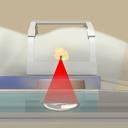
October 6, 2009 - At the University of Virginia Health System where they opened a new Magnetic Resonance Guided Focused Ultrasound Surgery Center, specialists are using magnetic resonance guided focused ultrasound (MRgFUS) to perform research that will represent a wide range of disciplines, including anesthesiology, biomedical engineering, gynecology, neurology, neurosurgery, oncology, radiology, radiation oncology surgery and urology.
Within coming months, research will focus on using MRgFUS to treat brain, breast, prostate, bone and liver tumors and conditions such as epilepsy, stroke, chronic pain, Parkinson's disease and essential tremor.
Neal F. Kassell, M.D., a professor of neurosurgery at the University of Virginia's School of Medicine believes that MRgFUS may be the most important therapeutic development since the scalpel.
During MRgFUS treatments, which are noninvasive and performed on an outpatient basis, patients lie on a table while doctors use the visual capabilities of magnetic resonance imaging to direct hundreds of individual and normally harmless sound waves at a single treatment point deep inside the body.
When ultrasound waves intersect the intense energy destroys tumor cells, and according to Alan H. Matsumoto, M.D. and chairman of UVA’s Department of Radiology and co-director of the new center, the technology is so precise that it can treat sites as small as a millimeter.
Treatments, which will become available in late October, will take about three hours. Side effects, if any, are typically minimal - minor cramping is most common - and patients can expect to feel well enough to resume daily activities almost immediately.
James M. Larner, M.D., director of UVA's Focused Ultrasound Center and chairman of the Department of Radiation Oncology, notes that focused ultrasound has the ability to destroy 100 percent of cancer cells, unlike chemotherapy, which kills only a certain percentage of malignant cells. Also, cancer cells cannot become resistant to focused ultrasound in contrast to chemotherapy. In addition, focused ultrasound has a rapid dosing drop off, meaning the technology concentrates high levels of heat on a target site but does not spill over to nearby healthy tissue, potentially causing damage or patient complications.
For more information: www.virginia.edu


 February 18, 2026
February 18, 2026 









